
Friday, February 17, 2012
Were Prospective Knox Publishers Given The Full Score On The Likely Legal Future Of This Case?
Posted by Peter Quennell

[Above: the seemingly hornswoggled Jonathan Burnham and Claire Wachtell of the HarperCollins house]
One publisher who passed on the Amanda Knox book then came here to read and told us he was rather shocked.
All the publishers going in to the auction were apparently not briefed by the Knox huckster team about the legal minefield this case still continues to represent. It may not have mattered to HarperCollins of course. It was HarperCollins that published OJ Simpson’s notorious “If I Did It” and they seem to have come out ahead.
One of the quirky outcomes of the Simpson venture the Amanda Knox team might like to draw a lesson from is that the “If I Did It” book (written by a ghost writer for Simpson, and as one Amazon reviewer said “chock full of omissions”) directly fueled the public anger that helped to put Simpson behind bars for a long time.
Typical of the hyper-cautious Italian system, this case is passing through three automatic phases like a three-act play. The Knox team can beef now about harassment and double jeopardy, but they have filed their own Supreme Court appeal, and it is written into the Italian constitution that no verdicts and sentences that are appealed are final until the Supreme Court signs off.
Act One
Act One started early in 2009 three months after Guede’s trial and we all saw as reported here on TJMK a very speedy and precise presentation of the prosecutions’ case. This was followed by the spectacle of Amanda Knox doing herself considerable harm in her two days on the stand. Thereafter through autumn and well into winter 2009, a weak and faltering defense was presented, with several court days simply cancelled because the defense could think of nothing more to say.
Judge Massei’s jury then quickly came to a unanimous verdict and he wrote up the reasons for it in an excellent 425-page report. He differed in only one major respect from Judge Micheli who in October 2008 concluded that Amanda Knox had organized and led the pack against Meredith and that Rudy Guede was unwittingly or accidentally drawn in to her torture and murder. (He still handed Guede 30 years.)
Judge Massei didnt cover the Rudy Guede evidence in nearly the same depth as Judge Micheli (Guede was only briefly in the Massei courtroom, and because Mr Mignini would not do a deal he barely spoke). In rather a stretch, Judge Massei argued that Guede set the escalation in motion which resulted in Meredith’s death. Few of us believe that.
UK and US lawyers have told us that under US and UK rules it is very unlikely that any judge would have then allowed the case to go to appeal. Knox and Sollecito would have served out their time and possibly emerged much better off for it - you can see the ugliness flowing back into them now..
Act Two
Act Two in 2010-11 saw the playing field becoming increasingly tilted. Mr Mignini happened to catch on tape a Florence prosecutor lamenting that the Monster of Florence cabal for which Doug Preston is such an eager beaver was tying his hands. The Florence prosecutor then sought to get his own back by taking Mr Mignini to court.
All sorts of amateur second-guessers on the evidence now got into the act, and few outside Italy any more had a firm command of the actual hard facts. It is rumored that Judge Hellman may have had a bias even before he ever got involved with the case. Mention of Meredith was almost nowhere to be found, and there was a constant drumbeat for Sollecito and Knox kept alive by their families and the US media and the MP Rocco Girlanda.
Helping the defenses was that soon after Meredith’s death the defenses played one huge trick. They failed to show up when Dr Stefanoni did her DNA tests. That then allowed them to impugn and slur her and her work with no hard evidence to hand. This rose to a crescendo when Judge Hellman’s two under-qualified consultants reported at appeal.
Amanda Knox still ended up being handed three years in prison, but with time served Judge Hellman released the two “young people” which was a verdict that to very few informed Italians made sense.
Act Three
Act Three starts with legal terrain that looks very different. Dr Galati has set the stage for a very, very tough third act, and he is making quite sure this time that the playing field is not tilted by any further monkey tricks. No wonder the publisher mentioned up top is surprised though. .
- NOT ONE non-Italian media source has made it clear that the Umbria regional prosecution office has a very special and prestigious status in Italy as the prosecution office that takes on cases against officials and politicians in the Rome government, so that the Rome police and prosecutors avoid conflicts of interest..
- NOT ONE non-Italian media source has explained who Dr Giovanni Galati really is. He could rightly be described as the most experienced and respected and capable of all Italy’s 24 regional chief prosecutors. He was a Deputy Attorney General with the Surpreme Court in Rome before his assignment just over a year ago to Umbria, and unlike the main Knox and Sollecito lawyers he knows the internecine Supreme Court rules and ways of addressing Italian law like the back of his hand.
- NOT ONE non-Italian media source has explained what we have reported in the four posts just below: that Dr Galati is stating that Judge Hellman BROKE ITALIAN LAW in two make-or-break respects. Judge Hellman is seen to have extended the appeals court’s terms of reference in ways that he is forbidden to do. And he introduced the DNA consultants which (as Mr Mignini several times argued) he was also forbidden to do.
Amanda Knox and Raffaele Solecito now face the fights of their lives. The last thing they need in this shark tank is a couple of biased self serving books “chock full of omissions” and anti-Italy smears.
They will almost certainly have to get up on the stand under oath and cross-examination and try to explain their scenario in a context where they each have contradicted and even accused one another. Their lawyers may be okay at trial or first appeal level but they are very outclassed by Dr Galati at this third level and it would seem the Knoxes, Mellases and Sollecitos would be best served to find new (very expensive) Supreme Court teams
Italians on the whole are angry and humiliated at the ill-argued first-appeal outcome. Judge Hellman seemed to show biases that he really should not have. Dr Mignini is back to being in the clear in his case as it was ruled (rightly) that the Florence prosecutors did not have jurisdiction over him. The Supreme Court took a very firm position in December 2010 that Rudy Guede did not act alone. The defense star witnesses Alessi and Aviello that might help accomodate to this have imploded, and both may face trials of their own.
A pretty grim portrait of Amanda Knox both prior to Meredith’s murder and while Knox was in Capanne prison is not hard to find in Perugia from multiple sources. If a devastating “Real Amanda Knox” book is not inspired by the HarperCollins book, we will be surprised, and it could sell more than hers. And if the slightest defamation about anyone in Perugia appears in the AK book, then HarperCollins will have the great joy of finding out what “calunnia” means.
President Obama and Senator Cantwell both have tough elections on their hands and Hillary Clinton and the Rome Ambassador David Thorne (an Obama political appointee) will need to be in ultra-careful mode this time around. Amanda Knox and her parents and Sollecito’s parents all face separate trials coming up. Rabid books will not help any of them there.
And in April the likeable book “Meredith” by her father John will be published - by a global publisher (Hachette) five times HarperCollins’s size.
Wednesday, February 15, 2012
Weighing The Ten Points On Which The Perugia Chief Prosecutor’s Supreme Court Appeal Is Based
Posted by brmull
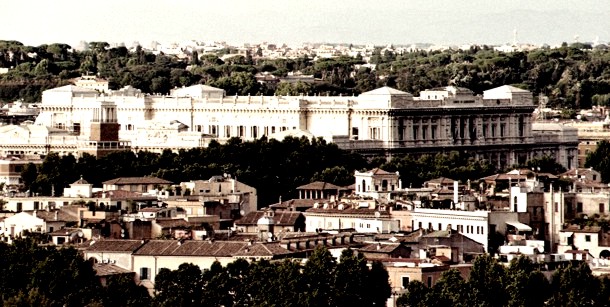
[Above: the Supreme Court of Italy seen from the south-east across the River Tiber]
The Chief Prosecutor and Deputy Chief Prosecutor of Umbria base their formidable appeal on ten points repeated here from ZiaK’s excellent translation below.
The reasons for the appeal to Cassation which Perugia’s General Prosecution presented today against the acquittal verdict of Amanda and Raffaele are based on ten points of the second-level verdict.
The first is the lack of grounds for the decision, in the decree of 18 December 2010, to allow the forensic testimony/expert witness in the appeal judgement.
The second, in contrast, concerns a contrary decision: the decision to not allow a new forensic investigation requested by the prosecution at the end of the ruling discussion. In the appeal to Cassation it is written that the Appeal Court’s rejection reveals “contradictoriness/contrariness and demonstrates manifest illogicality in the grounds for the judgement/reasoning report”.
The other points deal with the decision by the Appeal court of Assizes of Perugia to not hear the witness Aviello, also the definition of “unreliable” [in the Hellman Report] with reference to the witnesses Roberto Quintavalle and and Antonio Curatolo, also the time of death of Meredith Kercher, also on the genetic investigations.
As well as the analyses of the prints and other traces, also the presence of Amanda and Sollecito in via della Pergola, also the simulation of a crime [the staged break-in], and also the exclusion of the aggravating circumstance of the crime of “calumny”.
1. I agree that the appointing of the independent experts was unjustified, because they were essentially just another opinion, a sort of tie-breaker, applying 2011 standards to 2007 evidence, who were revealed to have pre-existing biases about the questions posed to them.
Independent experts should be a piece of evidence, not a final arbiter. I know the Kerchers opposed the appointment of these experts (I don’t know about the prosecution) so clearly they weren’t a consensus choice, as is preferred whenever independent experts are employed.
2. I agree that if Conti and Vecchiotti were allowed to judge the scientific police by 2011 standards, then the court should have allowed testing using highly sensitive 2011 technology. Furthermore Dr. Stefanoni was left to defend her work against the academic experts, without any back-up from Dr. Novelli who is more than a match for the independent experts in terms of credentials.
3. I’m on the fence as to whether the court should have recalled Aviello to discuss why he had recanted his testimony. I don’t know what the legal procedure is when a witness recants while the trial is still underway.
4. I strongly agree that the decision to recall the man in the park, Curatolo, and then determining that the old man’s memory was unreliable four years after the fact, was completely inappropriate. Curatolo’s testimony at the first trial was more than adequate. Nothing was learned from this exercise except that his memory has become worse with time (whose hasn’t?) and that he subsequently got in trouble with the law, which is overly prejudicial.
5. If the court insisted on recalling Curatolo to try to assess his reliability, they should have done the same for the store owner Quintavalle. Instead he was deemed unreliable based on a cherry-picked selection from his 2009 testimony.
6. On the time of death, I’m one of those who believe Hellmann got it right, but it has no bearing on the defendants’ guilt or innocence, since they have no alibi for either time. I look forward to the prosecution’s argument on this.
7. I agree that Hellmann’s decision to accept the defense explanation for the footprints was arbitrary and not justified by his motivations report.
8. The luminol traces in Filomena’s room were improperly determined to be footprints. They were then lumped in with the footprints in the hall without any separate attempt at explanation.
9. I agree that the Court’s determination that the defendents would not lie about being at the cottage, simply because they were “good kids” is outrageous. (In the U.S. you can’t use character evidence to decide innocence or guilt, and doing so would mean a mistrial. I’m not sure about the situation in Italy.)
10. I agree Hellmann’s explanation for the simulation of a crime was a sham, in which he accepted all of the defense arguments and showed no curiosity at all about whether this scenario could actually happen. The court had clearly made up its mind about the case already and decided to just shove the staged break-in, a crucial part of the case, under the rug.
***
*The prosecution also wants to add “aggravating factors” to the charge of calumny. This is a freebie. I don’t know if it will have any bearing on the appeal.
**The fact that Hellmann seems to have applied the “reasonable doubt” standard to individual pieces of evidence, when this should only apply to the case as a whole, seems like a huge basis for appeal. I’m glad to see the prosecution bringing this up.
Perugia’s Excellent Umbria24 Posts Details Of Dr Galati’s Extremely Tough Supreme Court Appeal
Posted by Peter Quennell

Italian lawyers are already remarking that Dr Galati’s appeal as summarised below is as tough as they ever get.
In their view the Hellman report reads more like a defense brief than a balanced appeal-court outcome in a murder trial. Both judges were put on the case on mysterious instructions from Rome, suggesting that the minister of justice had perhaps been leaned on - the judge pushed aside was extremely annoyed.
Both Judge Hellmann and Judge Zanetti, while undeniably good judges in their own fields (business and civil), are vastly less experienced at criminal trials than either Judge Micheli or Judge Massei. The entry in the Italian Wikipedia describes them thus.
Although the Assize Court of Appeal was to be chaired by Dr. Sergio Matteini Chiari, Chairman of the Criminal Division of the Court of Appeal in Perugia, in circumstances not well understood Dr. Claudio Pratillo Hellmann, who chairs the Labor Chamber of the Court, has been called on to preside over the appeal court,
The judge to the side of the main judge, Dr. Massimo Zanetti, came from the Civil Section, and both had had limited experience with criminal trials both rather remote in time (only the cases of Spoleto and Orvieto).
Judge Hellmann’s announcement of the verdict on the night was very odd, suggesting he had been outnumbered and was embarrassed. Remarks he made the next day seemed to confirm that. The weak sentencing report is said to be not his work, and was written by Judge Zanetti.
The Supreme Court of Cassation could insist on a complete new appeal trial or a partial new trial in Perugia if it accepts any of Dr Galati’s arguments at all. His appeal statement appeal is in three tiers, and a reversal could be ordered at any tier..
1. The Hellmann Court’s wide scope was illegally far too wide
Italian judicial code is very clear on this. They MUST stick to just the appealed items and not wander all over the map. Judge Zanetti was quite wrong at the start to declare that everything was open except the fact that Meredith had been murdered.
2. The DNA consultancy by Stefano Conti and Carla Vecchiotti was illegal
Defenses had every chance to attend the Scientific Police testing the first time around. It was a slippery dodge to skip those tests and then slime them. They had every opportunity at trial to throw aspersions. They are not meant to shop around.
3. There are many problems of wrong logic, evidence, and witnesses
The Massei trial sat through weeks and weeks of skilled prosecution presentations of the evidence including the forensic evidence and the many witnesses. The Hellman court got to see almost none of this and heard mostly from the defense.
This translation is from Umbria24 by our main poster ZiaK.
Meredith case: the prosecution appeals to Cassation: the acquittal verdict should be “nullified”.
For the Chief Magistrates of the [Umbria] Prosecution, “it was almost exclusively the defence arguments which were taken heed of”
By Francesca Marruco
The first-level conviction verdict was “complete and thorough” while the verdict of the second-level is “contradictory and illogical”. For this reason, the General Prosecution of Perugia asks the Cassation to revoke or invalidate it.
“We are still extremely convinced that Amanda and Raffaele are co-perpetrators of the murder of Meredith Kercher” said the Chief Prosecutor of Perugia, Giovanni Galati and the Deputy Chief Prosecutor, Giancarlo Costagliola.
Verdict that should be revoked
“The second-level verdict should be annulled/revoked…. There are precise reasons for revoking it”, Mr Galati went on to say. In the Hellman reasoning report on the verdict with which the second-level judges acquitted the ex-boyfriend and girlfriend “there are so many errors, and many omissions. There is inconsistency in the grounds for judgement, which brings us to nothing.”
“It is as if they had ruled ex novo [anew] on Meredith’s murder” added the Deputy Prosecutor, Giancarlo Costagliola, “basing their decision solely on the arguments of the defence.”
“Normally the appeal judge evaluates the reasoning procedure of the first-instance judge and compares it to new elements. But this one missed that out altogether: there is no comparison between the checks carried out in the first and second instances. Only what was carried out during the appeal was evaluated.”
Only defence arguments were taken heed of
For the magistrates, in fact, the second-level judges “took heed, almost exclusively, of the arguments of the defence consultants or the reconstruction hypotheses that were largely to the benefit of the defense theses”.
The prosecutors who authored the appeal [to Cassation] also criticized the “method used”. “The first-instance verdict”, they wrote, “was summarized in just a few lines”,
“The verdict [which we] challenge completely ignored all the other aspects which corresponded with the accusation’s hypothesis, all the aspects which, on the contrary - as was seen in the reasoning report of the first-instance verdict - had been rigorously pointed out and considered by the Assizes Court [trial court] in its decision.”
“In examining the individual [items of] evidence, the challenged sentence has fallen into consistent procedural error in the weaknesses and evident illogicality of the grounds for its decision.”
Prejudice by the two appeal judges
For the General Prosecution magistrates, the second-level [first appeal] judges appear to have shown “a sort of prejudice” with the “infelicitous preamble of the judge [the author], who is supposed to be impartial”, when he declared that “nothing is certain except the death of Meredith Kercher”, which to the others [Mr Galati and Mr Costagliola] is nothing more than “a resounding preview/forecast of the judgement” and a “disconcerting” affirmation.
The ten points of the appealThe reasons for the appeal to Cassation which Perugia’s General Prosecution presented today against the acquittal verdict of Amanda and Raffaele are based on ten points of the second-level verdict.
The first is the lack of grounds for the decision, in the decree of 18 December 2010, to allow the forensic testimony/expert witness in the appeal judgement.
The second, in contrast, concerns a contrary decision: the decision to not allow a new forensic investigation requested by the prosecution at the end of the ruling discussion. In the appeal to Cassation it is written that the Appeal Court’s rejection reveals “contradictoriness/contrariness and demonstrates manifest illogicality in the grounds for the judgement/reasoning report”.
The other points deal with the decision by the Appeal court of Assizes of Perugia to not hear the witness Aviello, also the definition of “unreliable” [in the Hellman Report] with reference to the witnesses Roberto Quintavalle and and Antonio Curatolo, also the time of death of Meredith Kercher, also on the genetic investigations.
As well as the analyses of the prints and other traces, also the presence of Amanda and Sollecito in via della Pergola, also the simulation of a crime [the staged break-in], and also the exclusion of the aggravating circumstance of the crime of “calumny”.
Missing assumption/acceptance of decisive evidence
In the appeal to Cassation there is also mention of the “missing assumption/acceptance of a decisive proof”
In other words, of that proof [presented at trial court] which consisted of “the carrying out of the genetic analysis on the sample taken from the knife by the experts appointed by the Court during the appeal judgement, who did not carry out the analyses of that sample, thus violating a specific request contained in the [orders given to them] when they were assigned to the expert-witness post”
“In the second-level [Hellman] verdict”, the magistrates said, “the judges sought to refer to this in their own way, by speaking of an “experimental method” by which these tests/checks could be carried out.
But this is not the case”, said Deputy Chief Prosecutor Giancarlo Costagliola: “Dr Novelli [the prosecution’s DNA consultant at appeal] spoke of cutting-edge technology, not of experimental methods”.
Tuesday, February 14, 2012
Typical Of Dozens Of Cool Italian Reports On Mr Galati’s Appeal - This One By Cronaca
Posted by ziaK
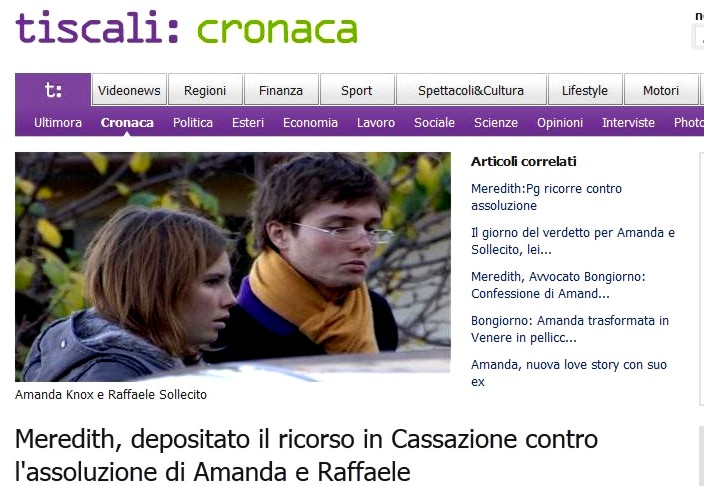
My translation. Please click above for the original.
Meredith: the appeal in Cassation Court has been lodged against the acquittal of Amanda and Raffaele
The appeal agains the acquittal of Raffaele Sollecito and Amanda Knox for the murder of Meredith Kercher was lodged this morning by the Prosecutor General. The appeal is contained in 111 pages, signed by the Prosecutor General Giovanni Galati and by the deputy [prosecutor], Giancarlo Costagliola.
In a meeting with journalists, Mr Galati and Mr Costagliola themselves explained that the appeal originates from their firm conviction that Sollecito and Knox are “co-perpetrators” in the murder of Meredith Kercher. Referring to the appeal verdict, Galati and Costagliola spoke of a verdict “needing to be revoked” which has “omissions and a great many errors”.
In their appeal the magistrates therefore call for the reversal of the second-level (Hellman) verdict and thus for a new appeal trial for the two young folk.
Inconsistency of the Reasoning Report Mr Galati described as “unfortunate” the opening words of the associate judge, Massimo Zanetti, who began the introduction of the report with the claim that “the only certainty” was the death of Meredith Kercher.
“A resounding forecast of the judgement”, the chief prosecutor claimed, “before even having heard the accounts of the prosecution and of the defence”. For Mr Galati, the appeal verdict “seems to be a second first-instance verdict, but in which the judges read the arguments of the defence beforehand [i.e. before hearing the prosecution’s case]”.
He then spoke of “inconsistency” in the reasoning report, of a “useless reasoning which achieves nothing”. In contrast, the Reasoning Report of the first-instance [Massei] trial was, to his mind, “complete and thorough, based on [elements of] evidence that were compatible with each other”.
Levelling to the defences’ stance “I immediately had the feeling that the appeal verdict was profoundly unjust” Costagliola then added, “and I am now convinced that it should be revoked. It is as if the judges had made an ex novo decision - tilting everything to the direction of the defence.”
Rudy Guede [who was definitively sentenced to 16 years through the fast-track trial system - editor’s note] was [in effect] put on trial again, even though he was not a defendant in these proceedings.
It leads one to think that, because the Court held that Guede was guilty of the break-in [of the window of the room belonging to one of the flatmates in via della Pergola - editor’s note], Sollecito and Knox should [therefore] be acquitted of the charge of executing a crime.”
Sollecito: “A 4-year Calvary” In the meantime, Raffaele Sollecito also remarked on the news, and spoke of “hounding against him”. “It is a never-ending story. For me, it is a real Calvary [nightmare] which has lasted 4 years”, he said, after having learned of the appeal lodged against his acquittal and that of Amanda Knox.
He was told the news by one of his defence attorneys, the lawyer Luca Maori. “I agree with him”, the lawyer said, “and to me it seems almost that the prosecutors are hounding him.”
First Post Reports That Meredith’s Family Have Joined In The Supreme Court Appeal
Posted by Peter Quennell

Click image above for a long and impressively fast report by Andrea Vogt about the Supreme Court appeal: and Meredith’s family being a party to it.
Andrea Vogt also notes the huge mismatch between the Hellman outcome and its terms of reference which Attorney General Galati targeted in his remarks today (see post below) and which the Supreme Court, based on past performance. may not take kindly to..
First the Court of Cassation must decide whether to consider the case or not. Once under consideration, if the court agrees with prosecutors, a new appeals trial is triggered. If they disagree, the current acquittal stands.
“They [the petitioning lawyers] will seek nullification of the second instance decision on points of law,” explained Stefano Maffei, an expert on Italian criminal law. “If they are successful, the case will then return to the Court of Appeals for a further assessment of the merit of the case.”
And on the problematic Amanda Knox book:
While US media this week described Knox as having bowled over editors with her “smart, self-assured and intelligent” manner, some in Italy have been less than impressed, instead criticising her for everything from her appearance since returning home to her latest attempts to profit from Meredith Kercher’s murder.
The real question is, how much exactly will Knox reveal? Will she publish all the letters she received in prison… including those fawning pleas for first interviews? Will she describe the jealousies of fellow prisoners, which she finally overcame working for the prison dispensary?
How much will she disclose about Rocco Girlanda, the Umbrian parliamentarian who used his parliamentary right to enter the Capanne prison at any time to regularly visit her and bring her gifts? Girlanda eventually capitalised on those visits to write his own book in Italian - a cloying account of those visits in which Knox’s letters to him were reprinted after being censored and redacted.
We will be drawing attention in a later post to several hundred additional questions.
Umbria Attorney-General Galati Files 111-Page Supreme Court Appeal Against Hellmann
Posted by Peter Quennell
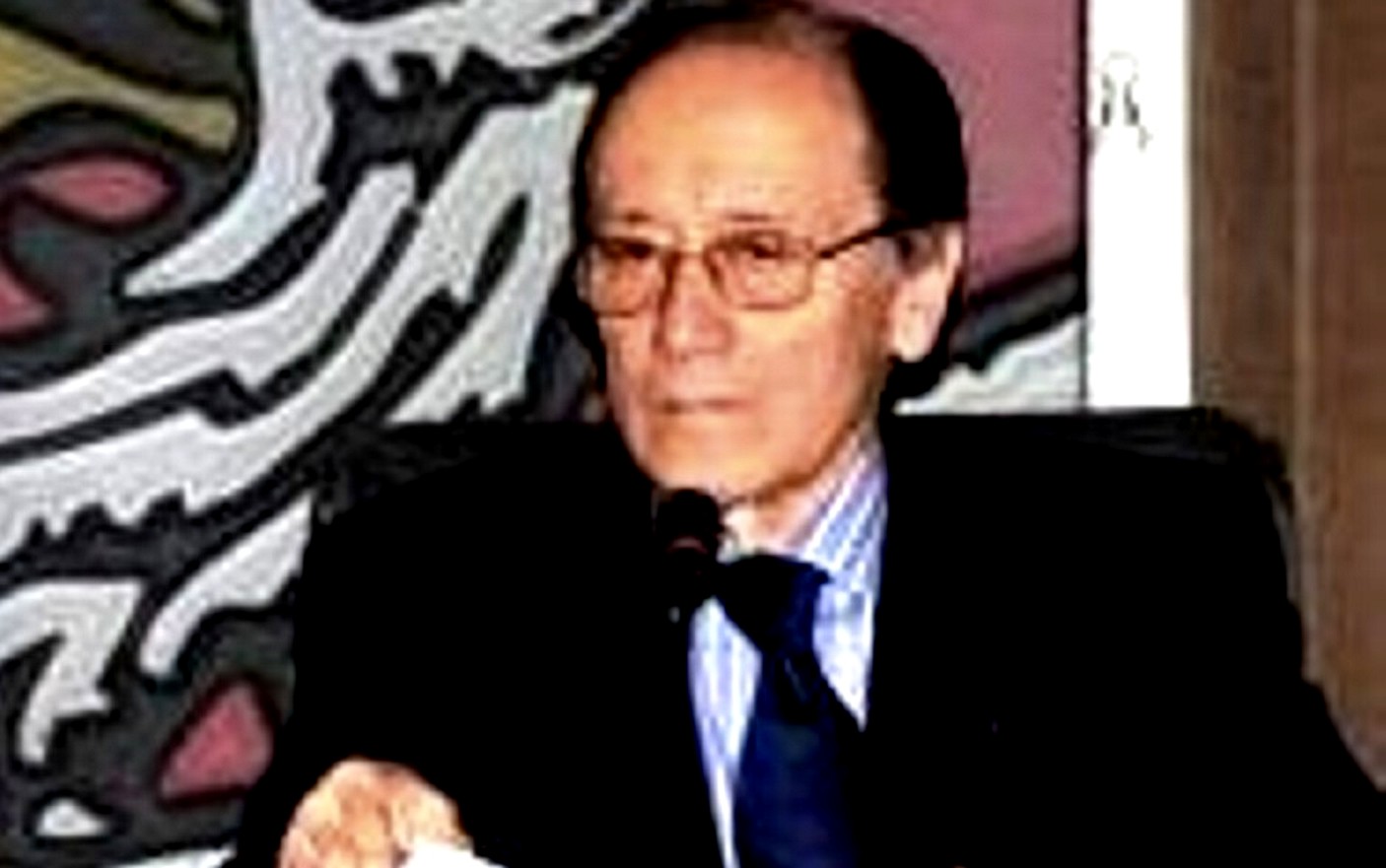
[We are told that this is AG Giovanni Galati at the recent justice info system announcement]
In submitting his 111-page appeal to Cassation Attorney General Giovanni Galati was extremely scathing in his remarks.
What Mr Galati has stated is that the appeal court of Judge Hellman exceeded its appeal mandate by far and tried to run a repeat trial at the first level, without the benefit of all the witnesses or a repeat presentation of evidence and cross-examination.
That overreach claim may resonate very strongly with the Supreme Court of Cassation which has historically repeatedly showed its distaste for first-appeal judges and juries who they seem to think too often overreach and must be restrained.
Cassation would already seem predisposed to any arguments coming from Attorney General Galati, as he was an assistant prosecutor general there, and predisposed against Judge Hellman, who has handled very few criminal cases (apparently none at all involving DNA) and produced previous quirky criminal-trial outcomes.
Book publishers might like to note that this could take two to five years to play out if it bounces back and forward several times between Rome and Perugia. Also that Italy’s law of calunnia may be applied to any wrong claims made in Knox’s and Sollecito’s prospective books.
Knox stated at trial that she was treated well on her interrogation night. Even so she still faces her own charges of calunnia. Her parents likewise. And Sollecito’s parents face a trial for evidence tampering and political manipulation.
Any books would seem to need to be moving targets at best. Maybe no paper version.
Monday, February 13, 2012
Italian Report That Prosecution Appeal Against Knox-Sollecito Appeal Verdict Could Be Filed Tomorrow
Posted by Peter Quennell

Italian media are widely reporting that the prosecution appeal will be filed for sure this week with the Supreme Court of Cassation in Rome.
We have previously posted on the pending filing of the appeal documents here and here and here. The well-infomed website Perugia Today now reports that the prosecution appeal may very well be lodged tomorrow, Tuesday.
The report goes on to sardonically remark that, based on media shots like the above, the “supermodel” seems to be losing her charms amid the hard realities that faced her back in Seattle.
The hair in a ponytail is not shining, and the absence of the usual pantsuit indicates that with freedom and the return to the US a few pounds have accumulated on the flanks.
The denim jacket takes away the rest of the charm that this girl had aroused in many in Seattle during the process. Away from the stage lights, the banality of being back daily hits home.
The report goes on to say that the prosecutors and police have never stopped believing in Knox’s guilt, even though Judge Hellman swept many strong indicators under the rug.
Hmmm. Finally Knox and Sollecito really might now want to return and take the stand. Lie detector tests and brain scans might also prove of help.
Tuesday, February 07, 2012
Knox Team to Appeal Conviction And 3-Year Sentence For Framing Patrick Lumumba
Posted by Peter Quennell
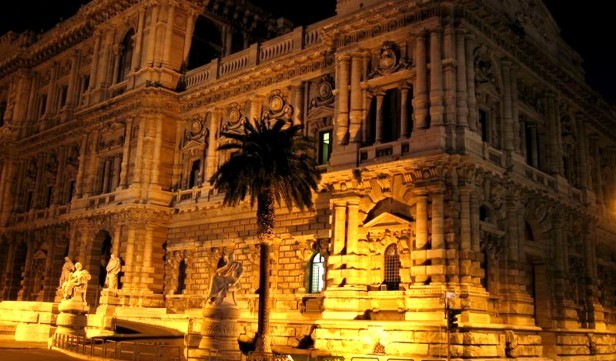
[Above: the Supreme Court of Cassation]
Appeals against Judge Hellman’s rulings must be lodged in Rome by 18 February.
Now Reuters is reporting a Knox-team appeal apparently announced by David Marriott. The Knox team probably had little choice but to lodge this seeming long-shot of an appeal.
Judge Hellman’s ruling left her “half pregnant” facing a hard-line and unbendable Supreme Court and it left her mom and dad more vulnerable in their own trial for calunnia for claiming in a UK interview that Knox only “confessed” in fingering Patrick because of duress.
Explanation of calunnia
The charge of calunnia (art. 368) has been commonly translated as “slander” in the English/US media. This translation is incorrect, however, as calunnia is a crime with no direct equivalent in the respective legal systems.
The equivalent of “criminal slander” is diffamazione, which is an attack on someone”Ÿs reputation. Calunnia is the crime of making false criminal accusations against someone whom the accuser knows to be innocent, or to simulate/fabricate false evidence, independently of the credibility/admissibility of the accusation or evidence.
The charges of calunnia and diffamazione are subject to very different jurisprudence. Diffamazione is public and explicit, and is a more minor offence, usually resulting in a fine and only prosecuted if the victim files a complaint, while calunnia can be secret or known only to the authorities. It may consist only of the simulation of clues, and is automatically prosecuted by the judiciary.
The crimes of calunnia and diffamazione are located in different sections of the criminal code: while diffamazione is in the chapter entitled “crimes against honour” in the section of the Code protecting personal liberties, calunnia is discussed in the chapter entitled “crimes against the administration of justice”, in a section that protects public powers.
Judge Hellman essentially contradicted Cassation’s ruling on Guede which agreed strongly that Guede and two others did it (Judge Hellman of course went for the very tenuous lone wolf approach which Judge Micheli and Judge Massei both shot down in some detail) which had many lawyers in Italy doing double-takes.
Knox in fact fingered Patrick when she was merely a witness who had not even been invited to Perugia police headquarters for the evening and who had volunteered for the questioning.
The interrogators have all claimed she was under no duress except the duress of hearing that Sollecito in the next interrogation room had just called her a liar and destroyed the latest of her various alibis.
Then she had several weeks (as did her mom) to move to spring a devastated Patrick from an adjacent wing in Capanne prison, but of course she didn’t.
Her lawyers never lodged a complaint against the claimed duress and on the witness stand at trial in mid-2010 the prosecutors actually got her to admit that she was treated well.
Key at this stage may be that Knox cannot use her natural advantages of being young and rather dopey and of being able to speak up in court at any time, not under oath or cross-examination, which she used twice in front of Judge Hellman (with lusty sobs and tears for herself and no caring for Meredith).
Cassation works like Supreme Courts elsewhere in Europe and the United States They receive the written appeals and then months or even years later hold very brief hearings, and then almost immediately issue a ruling. It looks to us like the case almost certainly gets bounced back to Perugia - and a new judge - for re-working.
Judge Hellman may have found Patrick’s highly aggressive lawyer impossible to overrule, and he would have been wildly unpopular in Italy to leave Patrick without even his small settlement. If Patrick’s lawyer does not somehow react to this appeal it will be a surprise. He may have the opportunity for rebuttal.
This case has thrown up a lot of possibilities for shortening the Italian process in murder cases and leveling the playing field in favor of victims and families. We’ll round up and post ideas for such reforms already being pushed in Italy by reformers such as Barbara Benedettelli.
Reforms might include no right to defendant statements in court without the possibility of cross-examination, the limiting of judges’ scopes in first appeals, and no jury being required for those appeals.
But everybody sure appreciates those judges’ and juries’ written statements. A precedent the whole world could use.
Saturday, February 04, 2012
Good News For Hard-Pressed Italy On Economic Growth On Two Surprise Fronts
Posted by Peter Quennell
Demonstrations against forced austerity are happening daily in Italy, and along with all other arms of government justice is being impacted.
We hope this wont affect a just resolution of Meredith’s case - but who knows? Two things happened last week that might help to keep justice on the rails.
At last week’s Euro summit European leaders (video above) showed they are waking up to the fact that austerity programs like Italy’‘s and Greece’s and Spain’s alone could do permanent nightmarish damage.
Italy’s youth unemployment has just passed 30 percent and Greece’s and Spain’s passed 50 percent a few weeks ago. High levels of unemployment like this could be permanently baked in if austerity is the only “solution” entered into.
The UN’s International Monetary Fund located in Washington United States has long been criticised for austerity and excessive concerns over equilibriums which often nip growth in the bud.
But at the annual economic forum in Davos Switzerland the head of the IMF of all people showed a promising new face. She actually came out and said European austerity is not enough and active growth measures are also absolutely vital. Here is the BBC’s report.
But neither the European leaders nor the IMF head described last week what such active growth measures would look like. It’s still blind leading the blind. They are all late to the game that the Asian economies have got quite good at (at their present level) in recent years.
Next post: the art of the possible. What cutting-edge state-of-the-art growth measures actually look like.
Wednesday, January 25, 2012
The Curt Knox And Edda Mellas Diffamazione Trial Will Resume In Perugia 30 March.
Posted by Jools
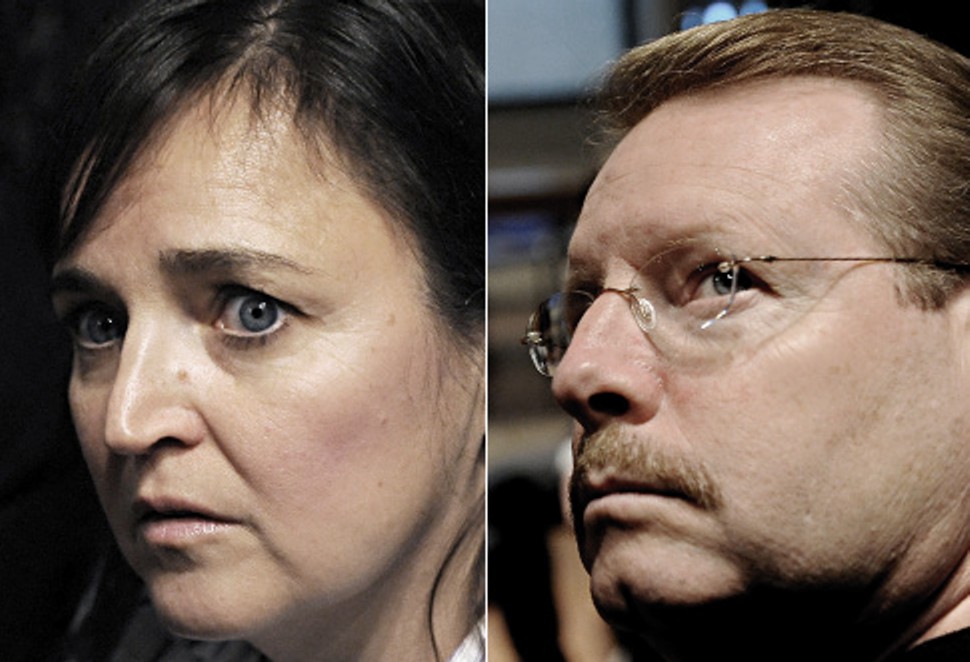
First, here is an explanation of diffamazione.
The charge of calunnia (art. 368) has been commonly translated as “slander” in the English/US media. This translation is incorrect, however, as calunnia is a crime with no direct equivalent in the respective legal systems.
The equivalent of “criminal slander” is diffamazione, which is an attack on someone”Ÿs reputation. Calunnia is the crime of making false criminal accusations against someone whom the accuser knows to be innocent, or to simulate/fabricate false evidence, independently of the credibility/admissibility of the accusation or evidence.
The charges of calunnia and diffamazione are subject to very different jurisprudence. Diffamazione is public and explicit, and is a more minor offence, usually resulting in a fine and only prosecuted if the victim files a complaint, while calunnia can be secret or known only to the authorities. It may consist only of the simulation of clues, and is automatically prosecuted by the judiciary.
The crimes of calunnia and diffamazione are located in different sections of the criminal code: while diffamazione is in the chapter entitled “crimes against honour” in the section of the Code protecting personal liberties, calunnia is discussed in the chapter entitled “crimes against the administration of justice”, in a section that protects public powers.
The suit against Curt Knox and Edda Mellas will commence in earnest on 30 March.
That is two days after the scheduled start of the Sollecito family trial in Bari for alleged subversion of justice, and about six weeks after the prosecution lodges its grounds for appeal with the Supreme Court against the appeal verdict on Amanda Knox and Raffaele Sollecito.
The defamation charges were lodged not by the Perugia prosecutors’ office but by those who considered themselves to have been defamed. Under their rules they are required to do that to safeguard the system.
Amanda Knox is quoted as saying how much she likes Italy and how she would like to be at that trial.
Amanda Knox “loves Italy and likes Perugia”.
She wants to return as a tourist but, if necessary, she’ll do so to testify in the trial against her parents”. To say as much was one of the defenders of the American [female], lawyer Carlo Dalla Vedova. Words came in the space of the proceedings for defamation against the parents of the student from Seattle, which is taking place in Perugia.
The name of Amanda Knox was included in the list of trial witnesses that the defence for Kurt Knox and Edda Mellas, lawyers Dalla Vedova and Luciano Ghirga intend to call to testify in court. “Both are accused of libel through the press in an interview which appeared in 2009 on the website of The Sunday Times” in which they spoke of alleged abuses on her daughter at the police headquarters during the questioning for the investigation into the murder of Meredith Kercher. For which crime Knox was provisionally acquitted on appeal.
In the meantime today the single judge Giuseppe Noviello has rejected an instance by the defence in relation to the territorial incompetence of the Perugian judiciary in dealing with the court proceedings.
“Amanda - said Dalla Vedova - is very interested” in the trial hearings against her parents and to which she is accused of calunnia, also against the flying squad police agents”. With her lawyers she maintains a correspondence by e-mail and every now and then they speak on the phone. “We have not seen her again ““ explains Dalla Vedova - since she was acquitted and went back to the United States. At Christmas though we exchanged greetings and yesterday she sent me an email asking for information on today’s hearing. Tonight I will tell her how it went”.
For the record the hearing in question was then postponed to March 30. On that date the witness for the prosecution will be heard. Then will be the turn for defence witnesses.
